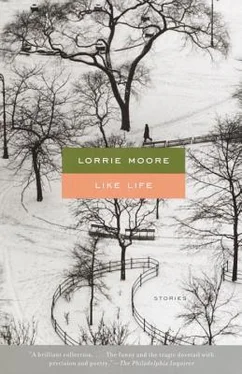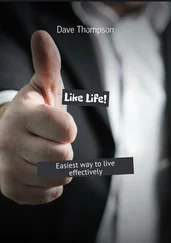They come down to the truckers
or the truckers go up
to the rooms with the curtains pell-mell.
They truck down for the fuckers
or else they fuck up
in the Pepsi Have a Pepsi Hotel.
There was silence. A door creaked open then shut. Odette looked up and saw Pinky in the back, tiptoeing over to a chair to sit. She had not seen or spoken to him in a week. Two elderly women in the front turned around to stare.
Oh, honey, they sigh; oh, honey, they say ,
there are small things to give and to sell ,
and Heaven’s among us
so work can be play at the …
There were other stanzas, too many, and she sped through them. She took a sip of water and read a poem called “Sleeping Wrong.” She slept wrong on her back last night , it began, and so she holds her head this way, mad with loneliness, madder still with talk. She then read another long one, titled “Girl Gets Diphtheria, Loses Looks.” She looked up and out. The audience was squinting back at her, their blood sugar levels low from early suppers, their interest redirected now and then toward her shoes, which were pointy and beige. “I’ll close,” she said loudly into the mike, “with a poem called ‘Le Cirque in the Rain.’ ”
This is not about a french monkey circus
discouraged by weather.
This is about the restaurant
you pull up to in a cab ,
your life stopping there and badly ,
like a dog’s song ,
your heart put in funny.
It told the story of a Manhattan call girl worrying a crisis of faith. What is a halo but a handsome accident / of light and orbiting dust. What is a heart / but a … She looked out at the two elderly women sitting polite and half attentive, unfazed, in the front row. One of them had gotten out some knitting. Odette looked back at her page. Chimp in the chest , she had written in an earlier draft, and that was what she said now.
Afterward a small reception was held out by the card catalogs. There were little cubes of pepper cheese, like dice, placed upon a table. There was a checkerboard of crackers, dark and light, a roulette of cold cuts. “It’s a goddamn casino.” She turned and spoke to Pinky, who had come up and put his arm around her.
“I’ve missed you,” he said. “I’ve been eating venison and thinking of you.”
“Yes, well, thank you for coming, anyway.”
“I thought you read very well,” he said. “Not all of it I understood, I have to admit. Some of your stuff is a little too literaturey for me.”
“Really,” said Odette.
People shook her hand. They looked at her quizzically, came at her with assumptions, presumptions, what they believed was intimate knowledge of her. She felt unarmed, by comparison; disadvantaged. She lit up a cigarette.
“Do you really feel that way about men?” asked a man with a skeptical mouth.
“Do you really feel that way about women?” asked someone else.
“Your voice,” said a young student. “It’s like — who’s that actress?”
“Mercedes McCambridge,” said her friend.
“No, not her. Oh, I forget.”
Several elderly couples had put on their coats and hats, but they came up to Odette to shake her hand. “You were wonderful, dear,” said one of the women, gazing into Odette’s nose.
“Yes,” said the other, studying her own botched knitting — a scarf with an undulating edge.
“We come to these every year,” said a man standing next to her. He had been searching for something to say and had come up with this.
“Well, thank you for coming this year as well,” said Odette, stupidly, and dragged on her cigarette.
Kay Stevens, the woman in charge of the fellowship readings, came up and kissed her on the cheek, the sweet vanilla wax of her lipstick sticking like candy. “A big success,” she said quickly, and then frowned and hurried off.
“Can I buy you a drink somewhere?” asked Pinky. He was still standing beside her, and she turned to look at him gratefully.
“Oy,” she said. “Please.”
Pinky drove them out past the county line to Humphrey Bogart’s. He toasted her, flicked a sparkly speck of something from her cheek, looked into her eyes, and said, “Congratulations.” He grew drunk, pulled his chair close, and put his head on her shoulder. He listened to the music, chewed on his cocktail straw, tapped his feet.
“Any requests?” the bandleader rumbled into the mike.
“O, give us one of the songs of Zion,” shouted Pinky.
“What was that?” The words popped and roared in the mike.
“Nothing,” said Pinky.
“Maybe we should go,” said Odette, reaching for Pinky’s hand beneath the table.
“OK,” he said. “All right.”
HE STRUCK a match to a candle in the dark of his bedroom, and the fire of it lit the wall in a jittery paint. He came back to her and pressed close. “Why don’t I go with you to New York?” he whispered. She was silent, and so he said, “No, I think you should stay here. I could take you cross-country skiing.”
“I don’t like cross-country skiing,” she whispered back. “It reminds me of when you’re little and you put on your father’s slippers and shluff around the house like that.”
“I could take you snowmobiling up by Sand Lake.” There was another long silence. Pinky sighed. “No, you won’t. I can see you phoning your friends back East to tell them you’d decided to stay and them shrieking, ‘You did what ?’ ”
“You know us East Coasters,” she said desperately. “We just come into a place, rape and pillage.”
“You know,” said Pinky, “I think you are probably the smartest person I have ever known.”
She stopped breathing. “You don’t get out much, do you?”
He rolled back and stared at the shadowed ceiling, its dimples and blotches. “When I was in high school, I was a bad student. I had to take special classes in this house behind the school. It was called The House.”
She rubbed his leg gently with her foot. “Are you trying to make me cry?”
He took her hand, brought it out from beneath the covers, up to his mouth, and kissed it. “Everything’s a joke with you,” he said.
“Nothing’s a joke with me. It just all comes out like one.”
THEY SPENT one last night together. At his house, late, with all the lights off, they watched another cassette of Holocaust Survivors. It was about a boy forced to sing for the Nazis, over and over. Because he could sing, he was the last to be shot in the head, and when they shot him they missed the center of his brain. He was found alive. “I must think of happy things,” he said now, old and staring off. “It may not be what others do, but it is what I must do.” He had a beautiful voice , said a woman, another survivor. It was beautiful like a bird that was also a god with flutes.
“Heavy,” murmured Pinky, when it was over. He pressed the remote control and turned away in the darkness, toward the wall, in a curve of covers. Odette pulled herself close, placed her hands around to the front of him, palms over the slight mounds of his breasts, her fingers deep in the light tangle of hair.
“Are you OK?” she asked.
He twisted toward her and kissed her, and in the dark he seemed to her aged and sad. He placed one of her fingers to his face. “You never asked about this.” He guided her finger along his chin and cheek, letting it dead-end, like the scar, in his mustache.
“I try not to ask too many things. Once I start I can’t stop.”
“You want to know?”
“All right.”
Читать дальше












